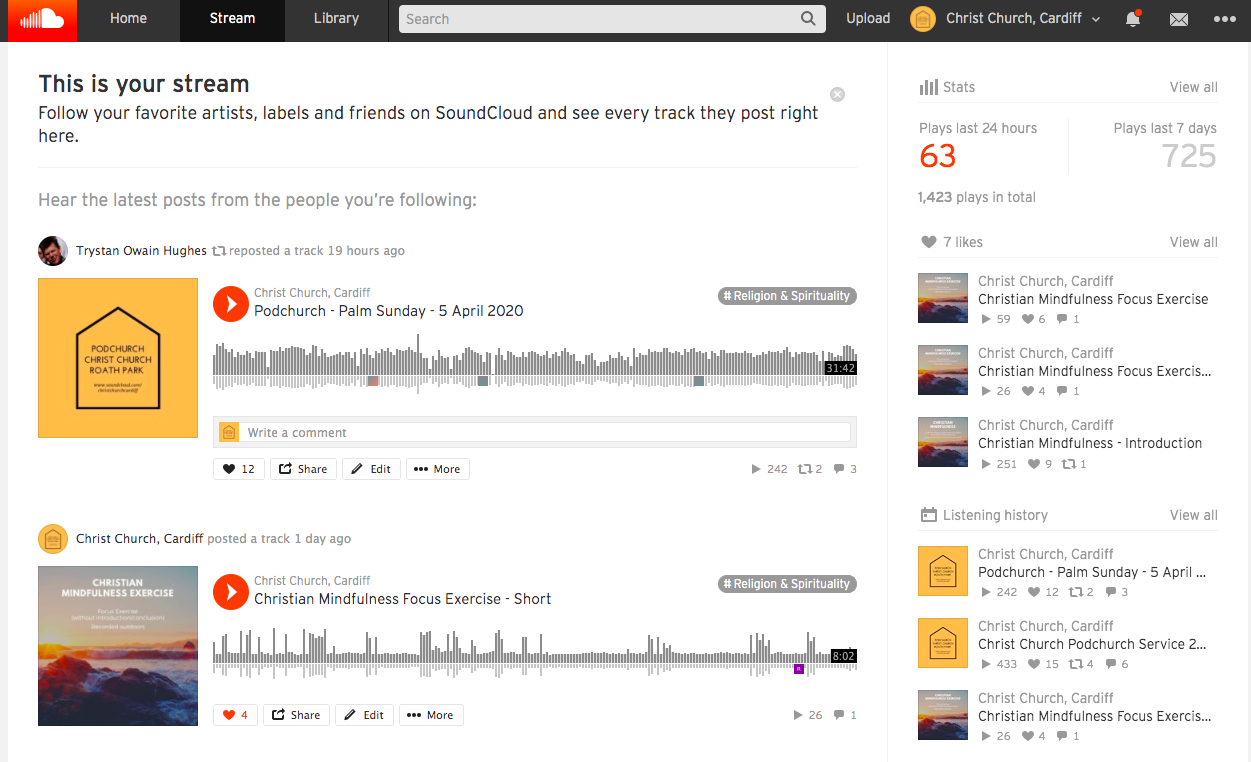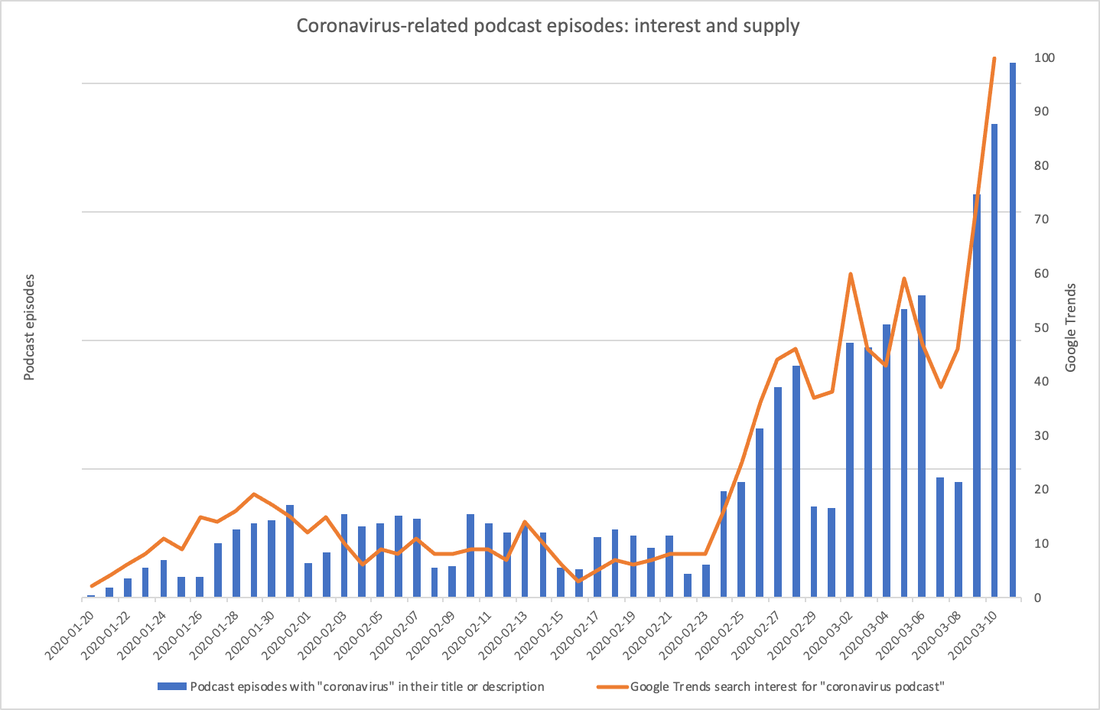|
I was extremely happy to become one of the nine 3-month Research & Development Projects funded by Clwstwr. It was a key milestone for my little company, Bwlb. In my head, I would devote as much of my working hours (between the school runs) as possible to the project during March, April and May 2020. And then Coronavirus happened. And my family entered 12 week lockdown due to one of us being high-risk. And school got cancelled. And I became a 'home-schooler' stay-at-home-Dad, not a 'working between the school runs' stay-at-home-Dad. So Month 1 of my Clwstwr R&D project has been a little different from what I imagined. Still, Month 1 has happened, and here is my first of three monthly blogs about the project, where I will present 5 key things I have learned. A bit of background. My Research and Development Project is about SMART Podcasts. I believe that innovation in podcast functionality is lagging behind the current explosion in content and consumption within the sector. I want to research how new functionality could be provided and I want to develop, specifically, a pilot of an 'accordion podcast' (one that can expand or contract its length to fit the time available to the listener). So, what have I learned in Month 1? Before I start, a note of explanation. As my project cranks up I'm sure these blog posts will be focused almost exclusively on the R&D, but in Month 1, the world and all of our lives changing grabbed centre stage, so these five things are a bit of everything. 1. Remote working can actually be BETTER Unbelievably, this picture helped me go 'a bit' viral on LinkedIn. I think my post was no.1 trending under #podcast for a few days, which was a completely new experience for me. It was just before lockdown really kicked in and I happened to be doing some creativity and podcast consultancy with the lovely people at Axia Origin and UK Power Networks. Something about us all being in the same boat not quite knowing how to best do a remote video session mixed with the informality of being in our own homes instead of a soul-less boardroom made the whole experience brilliant. We achieved more, we had more fun, we found it easier to think in fresher ways. I had been worried that having to do my Clwstwr R&D project remotely - due to Covid-19 lockdown - was going to make it harder. After this experience my mindset flipped, I now think the project will benefit from the new ways of working I will have to create, starting with a brainstorm over Zoom, which will be happening as soon as possible. 2. Without Clwstwr, Bwlb might not be here any more My company is small and young. It doesn't fit the brief for any government Coronavirus financial support. I have a small network of clients and at the moment most of them are scrabbling around to work out how they work now, not commission new bits of work from start-up companies like mine. So to have a 3 month project just starting out, where the funding is secure, that is just incredibly lucky. Without this funding, I could see a situation where I would be looking for full-time employment now and Bwlb could be folding before it ever had the chance to flourish. So THANK YOU Clwstwr. I am so relieved that when I started Bwlb I made a promise to myself to go for any opportunity I could, talk to anyone and everyone, be interested, be ambitious and just keep trying, keep applying, keep asking. I first heard about Clwstwr when I was at the BBC Writersroom Festival in Cardiff (in another life I'm an Oscar-winning screenwriter, honest) and I saw no-one was talking to the guys at the Creative Cardiff stand, so I talked to them and they told me about Clwstwr. I didn't think I'd get the chance to go on the Ideas Lab, and if I did, I didn't think I'd get funding for a 3 month project. But here I am. It can be done. But the old "you've got to be in it to win it" cliche applies. Clwstwr currently have an open call window, so get involved here. 3. If you can, do something helpful, or a tiny bit useful My family and I go to our local church here in Cardiff and I get on well with the vicar, Trystan. When lockdown started and the churches shut, I just had a feeling that a podcast service would work for our community, and I knew I could do it - I had the experience, the equipment and the knowledge. So I offered my services and PodChurch was born. Within a few days we had services, music and mindfulness content all going up on our Soundcloud page and the reaction, and number of listens, has blown us away. It's not volunteering to help the NHS (respect to everyone who has signed up for that) but it is something and hopefully it has helped some people in a small way. I think I've probably got more out of it than anyone else. In uncertain times, doing something positive (and new) that potentially helps other people (or is even just a tiny bit useful) is good for everyone, yourself most of all. 4. It's amazing when talented people take an interest in you and/or your project One of the best things about working with Clwstwr is the spirit of collaboration. All of my fellow cohort members are very talented and their projects are fascinating. I'm really happy to have been asked by Yvonne to collaborate with her and Lauren on her important project engaging young voters in Wales. Getting to know good people is one thing, them asking you to work with them is another. Another great thing about the Clwstwr experience is the professionals and academics which get linked to you to support your project. My three Jedi masters are Gavin (a Clwstwr Producer), Robin (a BBC executive) and Steve (a Cardiff Met Professor) and having met them all now and talked at length with them, I'm very excited about what I can learn from them. In fact, the learning has already started. Gavin helped me get over myself. I was worried about how to find the balance between wanting to talk to people about my project, and specifically the 'accordion podcast' idea, but protecting any original IP which may lie within it. I was erring too cautious and protectionist and after a chat with Gavin I resolved to be more positive and open. Also, I can already tell that Gavin's calm positivity is going to be a great help to me in the next few weeks and months. Robin made me feel so welcome when I met him at the new BBC Wales building in Cardiff, and gave me ways of thinking about my project which encouraged me significantly. The goal to make a working pilot using the best tech available, the validity of my viewpoint as an independent micro-business owner in a sector I know well, the opportunity to build on similar experimentation done by others before me - I left my meeting with Robin with these thoughts buzzing in my head. Steve opened my mind to the wider possibilities. The 'accordion podcast' is just one potential new functionality, let's brainstorm and dream and play around with what even a few of the other thousand potential ones could be (and as someone who ALWAYS runs the brainstorms, I can't wait to be sat at the 'virtual' table not standing at the head of it). The one quote that sticks in my head from my conversation with Steve is "people lie". So simple, and not as negative as it seems. The point is, you ask people why they do something (like listen to a particular podcast, or not finish it, or search out a different one) and if they don't know the answer, or can't explain it, they will make something up. The lesson is to question the answers. Always be curious, always look for other evidence, don't take everything at face value. 5. Responsiveness is one of Podcasting's superpowers This is something which has come out of the early part of my desk research for my SMART Podcasts R&D project. I read a fascinating article by Dan Misener in which he mapped the supply and demand of Coronavirus related podcasts as the epidemic grew. The number of podcasts about Coronavirus, and the number of people listening to Coronavirus related podcasts had almost identical growth curves. Sometimes the rise in supply came first, sometimes the rise in demand came first.
Dan's point was that relevance is key to the success of a podcast, but with my accordion shaped glasses on (can that be a thing?) I saw something a little different. Responsiveness is one of Podcasting's superpowers. Tone, content, guests, format, length, even entire series or brands can adapt to respond to what the audience wants or needs at that particular time. Dan was thinking content, I'm thinking functionality. If you get stuck in traffic on the way home, wouldn't it be great if your favourite podcast could increase its responsiveness - elongate with some added 'DVD extras' style content to fill the time and finish just as you arrived home. If you've had a manic day, you've only got 15 minutes free in the evening as you throw dinner together, wouldn't it be nice if the new edition of your favourite news or sports analysis podcast would concertina down to 15 minutes so you get all the key bits and don't miss the entire episode because your chance to listen passed? Again, my mind is buzzing, which is exactly what I want it to be doing for this entire project.
1 Comment
|
|
Photo from Phil Roeder




 RSS Feed
RSS Feed